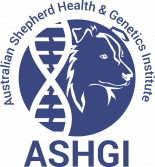Thyroid disease, specifically autoimmune thyroiditis, is the most common autoimmune disease reported in Australian Shepherds and one of the most reported diseases of any kind. Fortunately, the disease is treatable and the required medication is inexpensive. Even so, breeders should take steps to avoid producing affected dogs.
The disease is both over- and under-diagnosed. It is so common in dogs that those presenting with the most typical signs of the disease may receive that diagnosis by default. Weight gain, skin problems, and a tendency to seek heat are some of the more common signs. On the other hand, signs that are more frequently associated with other diseases may point away from a thyroid disease diagnosis when that is actually the underlying issue. Some abnormal thyroid test results can arise from other diseases or even normal states like a female’s estrus cycle. If a dog is exhibiting thyroid disease symptoms it should have a thorough veterinary exam and testing.
Because autoimmune thyroiditis is so common, all breeding stock should be screened at one or two years and annually thereafter until four years of age. A thyroid testing panel similar to that required by the Orthopedic Foundation for Animals should be administered at 2, 3, 4, and 6 years of age. If results indicate levels of T3, T4, or thyroglobulin autoantibodies above reference range. (T4 AA >20, T3 AA >10, TGAA >35) the dog is affected. If the dog clears all tests until 6 years of age it is not affected. Testing several times and no later than 6 years is important; the disease destroys the thyroid gland and after 6 years of age the disease may have destroyed the thyroid so antibodies will no longer be present.
Administration of thyroid medications within three months of a test can invalidate the results. Test values can vary if a dog is sick from something other than thyroid disease, injured, pregnant or in heat. It is entirely possible to have a clinically normal dog with abnormal test results, or the opposite, because of other conditions at the time of the test. This should not impact autoantibodies, but even so screening tests should be done only when the dog is sound, healthy and un-medicated. Female dogs should not be in or close to their heat cycles, pregnant, or lactating. A dog showing clinical signs but which has normal tests should be re-tested in 2-6 months.
Females with thyroid disease sometimes experience reproductive problems. Breeders should never use thyroid medication to enable pregnancy in a bitch that otherwise has difficulty conceiving. Thyroid disease aside, bitches which cannot naturally conceive, bear, and whelp a litter naturally are poor breeding candidates.
Dogs of either gender found to have autoimmune thyroiditis should be withheld from breeding. Because different autoimmune diseases frequently occur within a family, healthy first-step relatives of an affected dog (parents. Offspring, full- and half-siblings) should be bred only to mates with normal thyroid screening tests and no recent family history of any kind of autoimmune disease.
